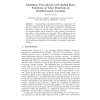47 search results - page 3 / 10 » Reinforcement learning with function approximation for coope... |
ESANN
2007
13 years 6 months ago
2007
The eligibility trace is one of the most used mechanisms to speed up reinforcement learning. Earlier reported experiments seem to indicate that replacing eligibility traces would p...
NIPS
2000
13 years 6 months ago
2000
The problem of reinforcement learning in large factored Markov decision processes is explored. The Q-value of a state-action pair is approximated by the free energy of a product o...
ATAL
2005
Springer
13 years 10 months ago
2005
Springer
Reinforcement learning problems are commonly tackled with temporal difference methods, which use dynamic programming and statistical sampling to estimate the long-term value of ta...
ESANN
2008
13 years 6 months ago
2008
Using multilayer perceptrons (MLPs) to approximate the state-action value function in reinforcement learning (RL) algorithms could become a nightmare due to the constant possibilit...
ICML
2007
IEEE
14 years 6 months ago
2007
IEEE
This paper investigates the problem of automatically learning how to restructure the reward function of a Markov decision process so as to speed up reinforcement learning. We begi...

